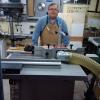Until recently, I thought that newunused tools had to be better than vintage tools. Then I had arevelation! I had ordered some brand new paring chisels and was veryexcited about having them for a lifetime ! Started paring and whatdo you know, the edges started rolling over. Tried another but gotthe same result. Obvioiusly, I was very disappointed.
I had made a post about this sadsituation and rec'd a PM from a very nice member on this site (heasked not to be mentioned here). He offered to send me a vintagebuck brothers chisel and asked me to try it. A few days later itarrived, and after setting the edge and polishing the back I gave ita try. It worked head and shoulders better than the new chisels thatI had purchased.
I want to thank members who want toeducate us newbees on the virtues of older vintage chisels. I am aconvert. I even bid on a old Hibbard, Spencer, and Barlett...... andwon. Obviously, not all chisels will be good quality but searching for a good older chisel can be fun!!!





 Reply With Quote
Reply With Quote










